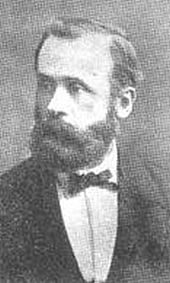Karl August Woll
Karl August Woll (born February 10, 1834 in St. Ingbert , † April 17, 1893 in Strasbourg ) was a poet of the Palatinate dialect poets and, as a "classic", belongs to their founders.
Life
Woll was the eldest son of the baker Johann Woll and his wife Barbara, b. Hauck and grew up in poor conditions. Nonetheless, his parents made it possible for him to study at the Bischöflichen Konvikt in Speyer . In 1853, the year his father died, he took his final exam there. The following year he began to study law in Munich , but dropped out after twelve semesters to study theology at the Georgianum in Munich from 1860 onwards at his mother's insistence . From 1861 to 1864, after successfully completing his studies, he worked as a tutor for various wealthy wine-growing families in Deidesheim .
In 1863, Woll took over the editorial management of its local history supplement “ Palatina ” at the Pfälzer Zeitung in Speyer , in which he also published poems he had written himself. In 1868 he published his first volume "Gedichte", which was written in dialect, but also contained high German verses such as the patriotic "Wasgau songs". This volume was later to become known with slightly different content under the name "Palatine Poems" and appeared in eight editions. In the later editions, some lyrical poems were left out, "since everyone can sing his Weltschmerz himself," as Woll wrote in the foreword to the second edition from 1873.
The meeting with Karl August Woll and Karl Christian Nadler in Speyer sparked Ludwig Hartmann 's interest in writing dialect texts himself.
In 1869 Woll resigned from the editorial office and became a French teacher at the Speyr grammar school for a year. In the Franco-Prussian War he was used as a medic. He then became orphanage inspector for Lower Alsace in Strasbourg in November 1871 and remained in this position for 20 years until his early retirement in 1891; finally Woll had found “his” job.
During these years, Woll dealt a lot with the history of his homeland. This time was the most creative of his life, while he himself described his Deidesheim years as the most beautiful of his life. A planned "Bliesgaubuch" remained unfinished. He died at the age of 59. His grave in the St. Ingbert “Old Cemetery” is in great need of restoration. The marble bust that stood there until a few years ago has now been stored.
His younger brother Franz Woll († 1899) held the office of organist at the St. Josef Church in St. Ingbert for 40 years .
In St. Ingbert and Speyer, one street was named after Karl August Woll.
The Palatinate State Library in Speyer owns his estate.
Works
- Poems ; Speyer 1868
- New Palatinate Poems ; St. Ingbert 1902
- The Bitzler: Life and Poetry by Hans Blinn ; Landau id Pfalz, 1993 (last edition, first edition unknown)
- Karl August Woll's correspondence with Prince Edwein II von der Leyen in the years 1888–1891 ; Gauting 1960
literature
- Wolfgang Krämer: Karl August Woll, a Palatinate poet and writer ; Speyer 1923
- Ludwig Eid : Karl August Woll. Speech on his special day on February 27, 1926 in St. Ingbert ; Speyer 1926
- Reiner Marx: Article by Karl August Woll . In: Time brings fruit - Saar-Palatinate authors' lexicon . Saarpfalz, special issue 2008, Homburg 2008, pp. 196–199, ISSN 0930-1011
Web links
- Literature by and about Karl August Woll in the catalog of the German National Library
- Literature on Karl August Woll in the Saarland Bibliography
- Saarpfalz-Kreis about Karl August Woll with a photo
| personal data | |
|---|---|
| SURNAME | Woll, Karl August |
| BRIEF DESCRIPTION | Palatine dialect poet |
| DATE OF BIRTH | February 10, 1834 |
| PLACE OF BIRTH | St. Ingbert |
| DATE OF DEATH | April 17, 1893 |
| Place of death | Strasbourg |

